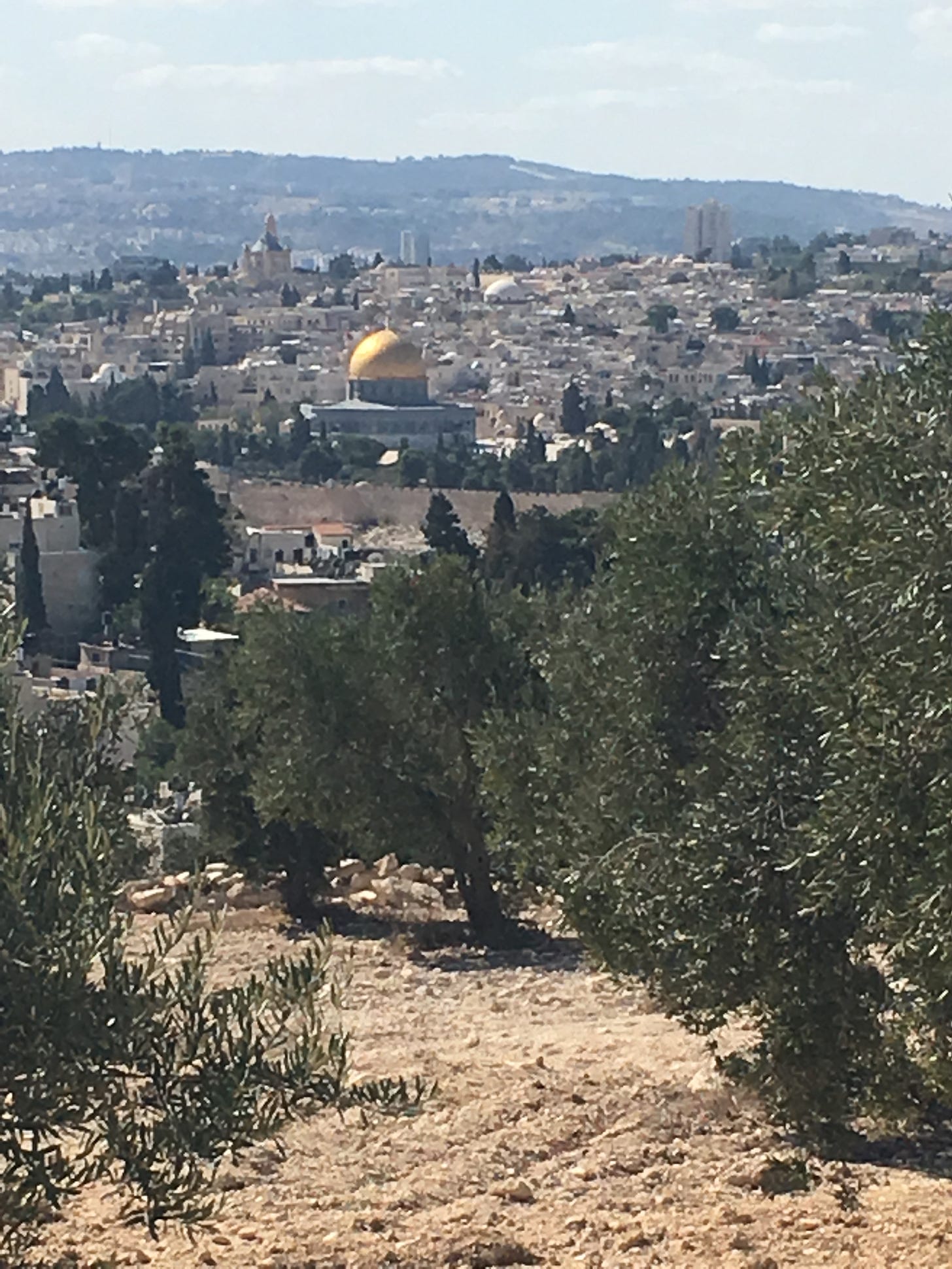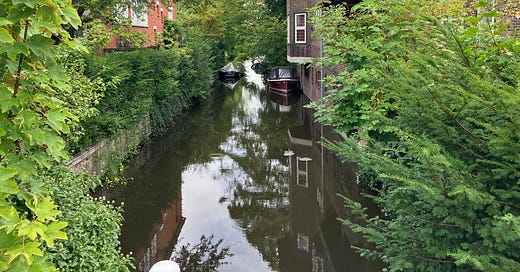All Saints
Now that it's December, let me tell you what a church planter learned by botching our first Halloween in the Netherlands
We have taken our kids on some pretty awesome Halloween outings. When they were two, we went trick-or-treating on the Mount of Olives in East Jerusalem with the English-language community of the Lutheran Church of the Redeemer. Living near Park Slope in Brooklyn, we also got to experience New York’s pull-out-all-the-stops version, both as it normally is and in its 2020 minimalist version (which was actually more fun). Even living in Oslo, the kids’ school class organized something small, but cool. This was the first year when I felt like we really dropped the ball.
For reasons too complicated to go into, we left Norway after only one year and moved to the Netherlands in late August. My wife won the academic lottery and landed the assistant professor job whose description seemed almost written for her. I do not have a job, per se, but I have a really exciting project as part of a church-planting team for the first Episcopal church in the Netherlands. But the unexpected international move (the second in two years) and the first couple months of setting in took a lot out of me, and I was just a bit too ready to believe that Halloween just is not a thing here, only learning on the 30th (a Monday) that many neighborhood groups do organize trick-or-treating, but always the previous weekend.
I hoped that the kids would not care, and thought they might not, since they always leaned more onto the German side of their identity for holidays. Everyone in New York did Halloween, but St. Martin’s Day processions were more of a secret society’s ritual. But of course they cared! How could they not? These were the kids who vaguely remembered that awesome haunted olive grove above the valley where the raised dead of the nations assemble for judgment! And they vividly remembered New York.

So they wore costumes to school (and weren’t quite the only ones). After school, I got them each a small pumpkin to carve, and they made some decorations, which was fun. But then they wanted to set some candy out front for trick-or-treaters and go trick-or-treating themselves. No matter how much I insisted that nobody was going to pick up the random assortment of vaguely sweet things (and it was very random), and nobody would be giving out candy, they were undeterred.
“But Papa,” one insisted, “you don’t know any of that for sure. Can’t we just go out and see?”
I am not proud of this, but I dug in. No, I had to fix dinner. No, there was too much going on. No, we weren’t going to find anything. I had other excuses, but none of them was the real reason. I was afraid. I was afraid of the kids being disappointed. I was afraid of looking stupid. I had it in my head that if we went out in costumes, it would be plain for all to see that we were not with the program. We aren’t Dutch. We do not know how normal people behave, and we clearly are not plugged in enough to know that this is not a thing here. Or if you want it to be thing, you have to have a social network, which we did not yet, and set it up in advance (for three days ago).
And silliest of all, but something I do a lot and am continuously working to unlearn: I felt ashamed of harboring a desire that the world would not fulfill, so I said no on the world’s behalf. In this case, it was a desire that strangers would be giving out candy to random children who came to their door. No, it was better to stay home and pretend not to be sad than to go out and be disappointed, visibly at that. No, we can’t go out, because nobody will be giving out candy.
“Yes, Papa, but let’s go see.”
And by God’s mercy, I finished cooking faster than I thought I would, and God caused that part of me that knows I tense up when I should relax and tun inward when I should go out, to speak more loudly than usual and say, “What of it? You put on amusing costumes and go for a walk. Perhaps you find a house receiving trick-or-treaters, or maybe it’s just a walk with your kids. And if others think you are foolish, isn’t it All Saints Eve? And whatever it is that makes saints saintly, is it not at least partly a bit of foolishness? ‘We thought that their lives were madness and that their end was without honor. Why have they been numbered among the children of God? And why is their lot among the saints?’ (Wisdom 5:4b-5).
Papa, can’t we just go see what is out there?
Yes. Yes we can.
No, nobody else was in costume. No house we found gave any signals that children should come to the door. And the little offering the kids left in from of our building stayed there. But we had a great walk. The weather was perfect. I hadn’t really seen our town by night yet, and it’s very pretty. And I was with my kids. We were happy. And it was the Eve of All Hallows, so I knew the veil was thin, and that were in the excellent company of foolish weirdos who blessed the world by desiring that it be something it was unreasonable to expect, but living like it was true, and thus touching the truth of it.
The church I am planting is called All Saints.
I was not involved in picking the name, but I am pleased with it. And this little All Hallows walk gets at smemthing I think is key to what we are trying to do at All Saints, as well as most of church life in our ostensibly secular age (certainly secular in that few go to church, and not many say they miss it). The baggage that church has is different in the U.S., Norway, and the Netherlands, but what we are doing is weird here and would be weird back where I come from. This is not the sort of start-up most people imagine.

But I want to live in a Halloween world where, as a meme that went around this year puts it, “strangers come to us, beautiful, ugly, odd or scary, and we accept them without question, compliment them, treat them kindly, and give them good things.” The quote is attributed to Steve Garnaas-Holmes. And let me add something to it: our Halloween guests do not just come to us as they are. They also come as they are not, or as they only sort of are.
It was a wise user of words who gave us the English expression “make believe,” which I spent must of my life mistakenly thinking meant “fake,” but which could mean exactly what it says, to make oneself or someone else believe. Believe what? Halloween leaves that somewhat open. That one is a witch, a ghoul, a fairy, or a football player? Sure! But also: that what one is need not be constrained by what one has been, by what others take one to be, or be what uninspired gentlemen and ladies deem possible under what they learnedly but mistakenly think are nature’s laws, rather than the rules of its game (and our game). Would you think it theologically pedantic if I now went on to say that, knowing it or now, we make one another believe that what we are and are becoming is the image of God? That we make believe that we are what are actually are in the wisdom of God? Long-suffering, faithful, foolish souls becoming saints? Pedantry and slight-of-hand or not, I do believe that. I will even be so bold to say that I know it to be true, even if I often forget. “Prayer is my profession,” says Bernard of Clairvaux, “though I do not live as though it were.”
I joined this church plant as one of its priests because I do not care if it is actually Halloween, or the day that people around here celebrate it. I want there to be a place, time, and community where people can make believe, where we make our Halloween offering to God and one another, even if it is weird and random, and we receive back god’s Halloween, God’s make believe, God's let-it-be. And if we are the only ones there on a Sunday, I at least hope that nobody will be able to say they didn’t know they were invited. And if they got the invitation and thought it silly, no matter. There are worse things than being thought silly, and perhaps it will bless them anyway.
At any rate, I want to accept my son’s invitation to put on the costumes we have and set out the offering we have, and go see what there is, to walk and live as though it were perfectly plausible that strangers would smile and give us candy, to risk disappointment, but be open to surprise. And if we are exposed as clueless foreigners in the country where we live or on the whole earth, “our citizenship is in heaven” (Philippians 3:20). We are fools who desire that the world be something it usually does not think it can be.
As it happens, nobody was disappointed, even though we did not get any candy. We stopped at the grocery store and got macaroons and ice cream, which we ate after I warmed up the dinner I had waiting for us. In honor of that Jerusalem Halloween and in anticipation of a party in the New Jerusalem, I had made the barley risotto from Ottolenghi and Tamimi’s Jerusalem cookbook, and we ate by jack-o-lantern light in the company of thousands of thousands of guests we couldn’t see.
And I told my son that next time I am being an idiot, he can remind me of this. I’ll probably regret that part.




